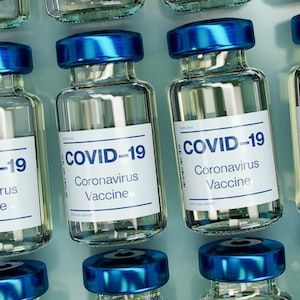Article
Causal Association in Myocarditis-like Illness Following COVID-19 Vaccination
Author(s):
Investigators considered myocarditis favorable to COVID-19 infection, with resolution of symptoms in all patients.

Vaccination for COVID-19 has generally been considered well-tolerated, with few isolated serious adverse events.
In a recent study, investigators, led by Christopher deFilippi, MD, Vice Chairman of Academic Affairs, Inova Heart and Vascular Institute, noted 7 individuals hospitalized for acute myocarditis-like illness following a COVID-19 vaccination.
Data was collected from the vaccine adverse event reporting system (VAERS).
Who was affected?
The 7 individuals were hospitalized in 2 US medical centers in Falls Church, VA and Dallas, TX.
All patients were male, <40 years old, and White or Hispanic ethnicity. The team noted that 1 patient reported a history of prior COVID-19 infection.
In addition, 6 patients received mRNA (Moderna or Pfizer/BioNTech) and 1 received the adenovirus (Johnson & Johnson) vaccine.
The 7 patients presented 3 – 7 days post vaccination with adverse events, including acute onset chest pain and biochemical evidence of myocardial injury.
Myocardial injury included cardiac troponin (mean peak = 15.77 ng/mL) or elevated high sensitivity troponin I (mean peak = 7000 ng/mL).
Further, all patients were hemodynamically stable, with no pericardial friction rub or rash.
According to investigators, electrocardiogram (ECG) patterns varied from normal to ST segment elevation.
They found no evidence of obstructive coronary artery disease in patients after undergoing invasive coronary angiography.
Investigators found multi-focal subepicardial late gadolinium enhancement (LGE) was present in all patients. Further, no patients reported heart palpations and there was no evidence found of sustained heart arrhythmias.
Patients also had no evidence of active viral illness or autoimmune disease, with negative PCR testing for acute COVID-19 infection during hospitalization.
Treatment included beta-blocker and anti-inflammatory medication, with hospital length of stay between 3±1 day.
Investigators noted all patients’ symptoms were resolved by hospital discharge.
What does this mean?
Data show the series of 7 patients who presented myocarditis-like illness after COVID-19 vaccine represents a potential causal association with the vaccination, due to the temporal relationship.
The team observed a negative endomyocardial biopsy may represent sampling bias, where as a spike in protein IgG may indicate an alternate vaccine related immune mechanism in patients.
They noted that future studies are needed to confirm if the rate of myocarditis-like illness is higher after vaccination than the baseline rate of myocarditis in similarly aged individuals in the population.
As well, further studies are needed to determine populations at higher risk of negative outcomes, as well as potential treatment strategies.
Conclusion
The team concluded that the vaccine-associated myocarditis-like illness was ultimately favorable, with resolution of symptoms in the patients.
They noted that the risk-benefit for vaccination remains favorable, compared to the potential morbidity of COVID-19 infection.
“Vaccine adverse event reporting remains of high importance and further studies are needed to elucidate the pathophysiological mechanism to potentially identify or prevent future occurrences,” investigators wrote.
The study, “Myocarditis Temporally Associated with COVID-19 Vaccination,” was published online in Circulation.





